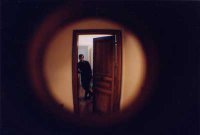
Written and Directed by Michel Gondry
I am half asleep while writing this review. I think that’s appropriate. I think, therefore I am awake? Maybe I’ll fall in and out of my own dreams while I write but I doubt it. With rare exceptions, I do not have any difficulty differentiating between my subconscious and my conscious life. The same cannot be said for Stéphane (Gael Garcia Bernal), the naïve and enigmatic dreamer who carries us charismatically through writer/director Michel Gondry’s THE SCIENCE OF SLEEP. Stéphane has an easier time living in his dreams than in his monotonous day-to-day life where nothing seems to go the way he’d like it to. In his dreams, he is the host of “Stéphane TV”; he calls the shots and dictates to his apparent audience what to think, where to look and how to see things. His television studio comes from the imagination of Gondry, an infamous dreamer. The walls are made of egg cartons; the cameras are made out of boxes; and Stéphane is showing his audience a recipe for dreams. Mix random thoughts with reminiscences from the day just passed, like songs you heard or things you saw. Blend that with past memories of friends and lovers and you have hours of dreaming ahead of you. Take one part linear romantic boy-chasing-girl storyline and several parts absurdist visual experimentations, mix well and you have THE SCIENCE OF SLEEP.
Stéphane, a Mexican-born painter, has just moved to Paris at the insistence of his mother. His father has just died and she tells him that she can get him work as an artist. He has taken up in her apartment to find that not much has changed. He soon realizes that the work his mother secured for him is much less artistic than he had been led to believe it was. Amidst his frustrating disappointment, he meets Stéphanie, his next-door neighbor. Though it is not love at first sight, he falls for her and they dance the dance that no one seems to know how to dance without stepping on each other’s toes. Gondry weaves Stéphane’s pursuit of Stéphanie in and out of dream and reality. The seamlessness between each existence confuses the viewer to the point where one is not clear whether or not he is really getting any closer to her. When it isn’t going well in the real world, Stéphane almost forces himself into his dreams where he feels he has a better grasp on the situation. Though, the surreal atmosphere can be interpreted numerous ways, the real path can be traced and appreciated. There is pain but there is escape from that pain.

Gondry does not limit his analysis of sleep to when people are actually sleeping. In fact, while sleeping, Stéphane does an awful lot more living and learning than when he’s awake. Stéphane’s passion is for painting the greatest disasters the world has ever known. He would like nothing more than to combine these images with astrological forecasts, creating a new kind of calendar – disasterology. Instead of making this calendar, he is wasting away as a typesetter. Gondry now folds a different kind of dream into the batter, the conscious dreams we have that serve as hope for a better future. Stéphane might as well be asleep given that the drab nature of his work is pushing his dreams further away. Then there is the work colleague that sleeps with any girl he can. As every experience is purely visceral and devoid of meaning, he is passing his time more than anything else. Even the world’s greatest time waster is given a grandiose send off as Stéphane and his same colleague (Alain Chabat), hurl a television into a river after feeling inundated with useless imagery. Gondry is fascinated with the mysterious yet inevitable lost hours that pass while we sleep and the exorbitant amount of time that we knowingly throw away while we’re awake.
Though not as satisfying as Gondry’s attempt to answer the question whether it is better to have loved and lost than to have never loved at all (ETERNAL SUNSHINE OF THE SPOTLESS MIND), THE SCIENCE OF SLEEP is an amusing puzzler that plants seeds of thought in the gardens of your mind without you noticing. Stéphane’s life is a perfect example of how little life makes sense. His dreams take the elements of his life he cannot comprehend and try to make sense of them in his head by mixing them up and placing them in a new order. The sad thing is that while he’s trying to pick it all apart with his scientific approach to sleep, he doesn’t see that he’s met someone who speaks his language and shares similar dreams.


No comments:
Post a Comment